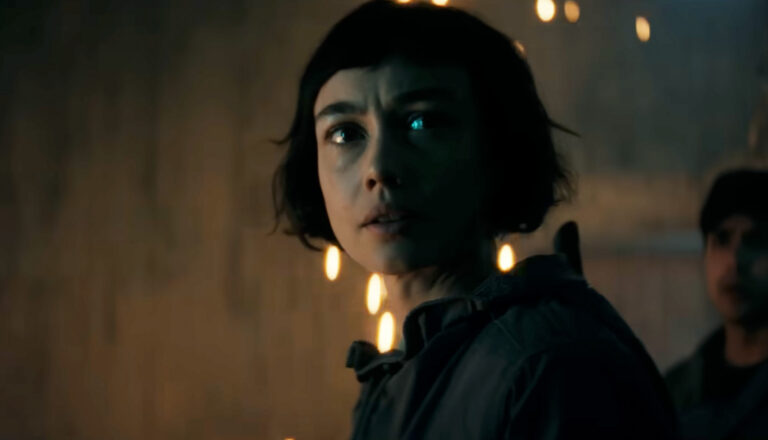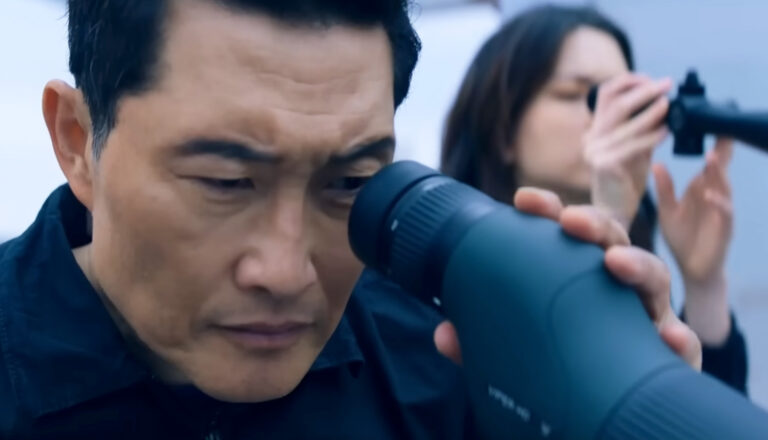
Alien: Earth
FX’s ‘Alien: Earth’ is just the latest graphically violent entry in the already graphically violent ‘Alien’ franchise.

Harrison Brennan was a doctor, a husband, a father. He was black.
Now he’s dead.
He made the mistake of going to a Chicago convenience store late one night, shedding his surgeon scrubs for a hoodie. A crook robbed the place, slugged the manager with a gun and ran off. When Harrison tried to help the injured man, Officer Paul Evans saw the black man and the screaming injured manager in what appeared to be a confrontation, and he pulled the trigger of his service revolver. Twice.
In a fraction of a second, life ended for Harrison—and the lives of many were forever changed.
Paul was exonerated by the federal government. Now he’s back in a squad car, trying to make Chicago a little safer—all he got into the force to do, honestly. But just because the government said he wasn’t a criminal doesn’t mean he’s not potentially culpable. A $5 million civil lawsuit filed against him and the city ensures that the awful mistake never leaves his consciousness.
Not that it would anyway. Again, the government can say he did nothing wrong. But that doesn’t erase Paul’s guilt—or the fact that his old partner, without his knowledge, took the store’s security footage in order to protect him.
“A month from now? No one’s going to care about you,” she says. “Or Harrison Brennan.”
Daniel Calder, Harrison’s husband, is the guy who filed the lawsuit, of course. He and his adopted daughter, Jira, don’t need the money—but they sure could stand some closure. Harrison’s death has been hard on their relationship. It doesn’t help that Jira’s black, like Harrison, and that Daniel’s white. When Daniel tells her that he wishes every day that he’d died instead, Jira shoots back, “It never would’ve happened to you!” The teen wants a parent who not only loves her, but looks like her, too.
Jira’s birth mom is quite close by, turns out, unbeknownst to her. Tia Young was just 15 years old when she had Jira—a baby not only adopted by Harrison, but delivered by him as well. And as Jira has grieved Harrison’s death, Tia has watched from only a slight remove.
But circumstances make it difficult to forge a relationship. You see, Tia’s no longer a scared 15-year-old, but a wife and mother with her own little boy to think about. Maybe more importantly, she’s running for Chicago’s city council. And if her living, breathing, youthful indiscretion was known to everyone, her political career would implode. Or so she fears.
CBS seems to be targeting one demographic with The Red Line: folks who are fans both of NBC’s This Is Us and of progressive politics. It’s so woke that makers of caffeine tablets should really talk to CBS about potential branding partnerships.
I say this without finger-pointing, by the way. Or, at least much. Listen, we face some really vexing social issues in this country, but I’m not sure if a self-serious, shallow network drama is the most effective place to deal with them.
The show’s sense of sexuality is perhaps the biggest social-issues hook where The Red Line tries to draw attention. While most every new series features a LBGTQ character or two, this one makes its leading man a gay man who’s grieving his husband even as the show seems to suggest a new romance might be just around the corner. It adds another LGBTQ element wth Jira’s BFF, who identifies as nonbinary. (When that character, Riley, laments the fact that Riley’s brother won’t call the character “they,” as the Riley wants, Jira mocks the brother for playing too much Dungeons & Dragons.)
But while many a discerning Christian family may recoil from the show’s unbiblical sense of sexuality (and many a conservative will fume at its reactive sociopolitical bent), The Red Line offers some positive elements, too. And they begin with its adoption storyline.
Sometimes, entertainment suggests that moms dealing with an unwanted pregnancy have just two choices: to keep the baby, or to abort it. The Red Line stresses that there’s a third path—and perhaps the most honorable of all. When Tia struggles with her decision to contact Jira, she admits to her husband that she just wants to do the right thing. “You did,” he says, “when you gave her up.”
We know—and are told repeatedly—that giving birth to a baby isn’t the same as being a mother, and that parenthood has little to do with DNA: It’s about being there for your kid every day. But that doesn’t minimize what a birth mom might feel for her baby, or the child’s desire to know where she came from.
The show has gone relatively light on content, too. Sexual identity may constitute a significant element of the show’s dramatic context, but we don’t actually see a lot of sex. Violence takes a back seat to personal relationships. Even the language is dialed back from what you’d typically expect to hear in an edgy drama these days. It features a pretty likable cast, too.
But while The Red Line offers some merit in spots, that’s a little like saying a steak-turned-charcoal-briquette is redeemed by a dollop of applesauce on the side. Even as it tries to cater to the This Is Us crowd, the show leaves behind that popular NBC series’ wit, writing and heart. What CBS hoped would be an inspiring drama turns dispiriting and disquieting instead.
The Red Line is technically named after the train line that Tia’s husband drives and that Jira and Daniel occasionally ride. But it works so much better as advice for what viewers should do if they see the show written, for some reason, on their calendar: Take a red pen and draw a line right through it.
(Editor’s Note: Plugged In is rarely able to watch every episode of a given series for review. As such, there’s always a chance that you might see a problem that we didn’t. If you notice content that you feel should be included in our review, send us an email at letters@pluggedin.com, or contact us via Facebook or Instagram, and be sure to let us know the episode number, title and season so that we can check it out.)
In the two-hour series premiere, Dr. Harrison Brennan is shot and killed by policeman Paul Evans in a case of mistaken identity. Six months later, both Paul and Harrison’s family are dealing with the aftermath.
We see Paul shoot Harrison twice in the back: The bullets go all the way through the victim’s torso, because we see bloody bullet wounds in the man’s sweatshirt-covered chest as he expires on the floor. Paul thought Harrison was a crook, but we see the real culprit hit a convenience-store manager on the head with his gun. (Blood pours from the open wound.) Just hours before, Harrison saves a man’s life at the hospital at which he’s working. We see blood on the man’s bare-chested body.
Harrison is married to a male history teacher named Daniel. We hear the two of them exchange terms of endearment over the phone; in the aftermath of Harrison’s death, Daniel grieves mightily. He gives a speech at an LGBTQ banquet, making a joke about how they met and admitting that he expects never to know so great a love as his.
Jira, Daniel’s and Harrison’s adopted daughter, hangs out with a nonbinary friend, Riley. Riley praises Riley’s parents for accepting their child’s pronoun wishes (to be called “they,” not his or her). Riley’s brother is not so understanding, it’s suggested. We hear about how Jira’s birth mother, Tia, was 15 when she gave birth.
We learn that Paul’s police partner took security footage from the convenience store so that Paul would be exonerated (which he is). Paul’s brother is paralyzed from the waist down (it’s insinuated that it happened in the line of duty), and the man smashes another guy’s face into a table. Jira is sullen much of the time toward Daniel, and at one point she runs away from him and spends all night on a train. We hear a reference to the city’s “sins.”
Characters drink wine, beer and champagne, and one appears to tote a flask around. We also hear them say “a–,” “crap,” “d—n” and “h—” one or two times apiece. God’s name is misused three times.


Paul Asay has been part of the Plugged In staff since 2007, watching and reviewing roughly 15 quintillion movies and television shows. He’s written for a number of other publications, too, including Time, The Washington Post and Christianity Today. The author of several books, Paul loves to find spirituality in unexpected places, including popular entertainment, and he loves all things superhero. His vices include James Bond films, Mountain Dew and terrible B-grade movies. He’s married, has two children and a neurotic dog, runs marathons on occasion and hopes to someday own his own tuxedo. Feel free to follow him on Twitter @AsayPaul.

FX’s ‘Alien: Earth’ is just the latest graphically violent entry in the already graphically violent ‘Alien’ franchise.

Based on novel by Jenny Han, this series follows the complex love life of Belly, a young girl caught between two boys who are childhood friends as she joins the world of debutantes.

In Nickelodeon’s preschool cartoon Tim Rex in Space, Tim and his T-Rex family solve problems together.

Good as its name, Prime Video’s ‘Butterfly’ is a flyaway thing. But its content can sting like a bee.